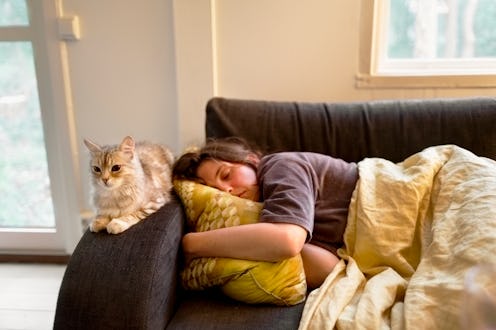Life
Experts Explain What’s Behind Your Weird Melatonin Dreams

If anxiety has you tossing and turning more often than sleeping and dreaming, you might be thinking about turning to the trusty bottle of melatonin in your medicine closet. Your BFF says it helps her sleep like a baby, but your big brother swears it gives him bad dreams. It might put you sleep, but can melatonin give you nightmares?
"Melatonin essentially provides a signal to your body that it is time to sleep," says Dr. Kimberly Fenn, Ph.D., professor of psychology and director of Michigan State University's Sleep and Learning Lab. As an endogenous hormone, melatonin is naturally produced by your body (in the pineal gland, for ye biology nerds). "In most mammalian species, melatonin is secreted for the duration of the dark period," AKA nighttime, Dr. Fenn tells Bustle. This means that when it gets dark out, the pineal gland comes out to party, and so does your body's melatonin production.
Your body doesn't always give you melatonin when you need it, though, which is where supplements come in. "Light can suppress melatonin production," Dr. Fenn says, "particularly blue light which is emitted by most devices." If you're on your phone until just before bedtime, melatonin supplements might give your body the extra boost of sleepiness you need. This can help shift your circadian rhythm to accommodate your new fixation with Animal Crossing.
Why does taking melatonin lead to nightmares, though? Dr. Fenn says it may have to do with your rapid eye movement (REM) cycle. "There is some evidence that melatonin can increase REM sleep. This is the sleep stage in which you are most likely to have vivid dreams. Thus, if you are spending more time in this sleep stage, you are more likely to have vivid or emotional dreams after taking melatonin."
Though melatonin is often promoted as a sleep aid that is not habit-forming, Dr. Fenn says that it's important to note that melatonin is considered a dietary supplement, so it's not regulated by the Food and Drug Administration (FDA). Because of this lack of regulation, she says, there's just a lot scientists don't know for sure about melatonin's relationship with nightmares.
Another consequence of this lack of regulation is that you usually can't be sure of the precise dose of melatonin in your supplement. "You may purchase a low dose melatonin (potentially to reduce possible side effects) and your dose may be even lower than advertised and have no effect," Dr. Fenn says. "Even worse, it may be much larger than advertised and cause serious nightmares." A few brands of melatonin do have verified doses, she notes, so you might want to seek those out.
Certified holistic nutrition consultant and founder of Gut of Integrity Stephanie Papadakis advises that people considering using melatonin start with small doses, like 0.5 mg. You might gradually increase your dose if you feel like you still need to and are experiencing no ill effects. And lest you're tempted to think that melatonin is a cure-all for poor sleep habits, Papadakis and Dr. Fenn both say that this is far from true.
"Most individuals should not need melatonin (unless they are traveling or are experiencing insomnia)," Dr. Fenn tells Bustle. Instead, it's important to practice good sleep hygiene as much as you can. Some things that can help you form those habits, Papadakis says, are "waking up and going to sleep at the same time everyday, reducing the use of bright screens two hours before bed, eating foods high in tryptophan, and taking an epsom salt bath before bed." All of these things can get you the right amount of shut eye, and hopefully without the potential nightmares.
Experts:
Dr. Kimberly Fenn, Ph.D., professor of psychology, director of Michigan State University's Sleep and Learning Lab
Stephanie Papadakis, certified holistic nutrition consultant and founder of Gut of Integrity
This article was originally published on